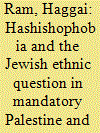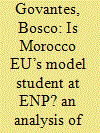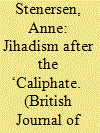|
|
|
Sort Order |
|
|
|
Items / Page
|
|
|
|
|
|
|
| Srl | Item |
| 1 |
ID:
181010


|
|
|
|
|
| Summary/Abstract |
Starting from the Islamic Revolution, Iran’s regime had increasingly been presented as the external source of Islamic fundamentalist movements in Turkey, leading to the establishment of a security-driven atmosphere in bilateral relations. However, Turkish-Iranian relations witnessed a positive change in the 2000s. The impact of the security discourse of Turkish elites regarding Iran’s Islamic regime declined and a rapprochement process began. This research suggests that such shift in Turkey’s foreign policy agenda became possible with the desecuritization of Islamic fundamentalism in Turkey’s domestic politics. The article proposes a securitization framework to analyse the link between domestic politics and foreign policy. Accordingly, it asks ‘How did the desecuritization of Islamic fundamentalism in Turkey’s domestic politics influence its foreign policy towards Iran?’ It analyses Turkey’s Iran policy comparatively in the 1990s and 2000s by utilizing speeches of Turkey’s political elites, public opinion in Turkey, changing the domestic political structure and alterations in foreign policy practices of Turkey towards Iran.
|
|
|
|
|
|
|
|
|
|
|
|
|
|
|
|
| 2 |
ID:
181014


|
|
|
|
|
| Summary/Abstract |
Concerns about electoral integrity have increasingly become the focus of political science analysis in recent years, but there has been very little systematic research on the strategic use of allegations of electoral wrong-doing for political advantage. Drawing on the literatures on legitimacy and electoral integrity, this paper develops a theoretical perspective on the strategic use of allegations of electoral impropriety for electoral ends, which, when such allegations are unjustified, constitutes a previously under-explored form of ‘meta-manipulation’. An original dataset, based on press reports from Turkey at the time of the 2014 local and June 2015 parliamentary elections, is used to test these hypotheses. The analysis shows that the governing party predominantly accused opposition parties of violent practices. The opposition parties, on the other hand, used allegations of electoral fraud and other forms of misconduct coupled with violence accusations against the governing party.
|
|
|
|
|
|
|
|
|
|
|
|
|
|
|
|
| 3 |
ID:
181016


|
|
|
|
|
| Summary/Abstract |
By drawing on crime fiction, press commentaries and archival records, this article explores Jewish public discourse about hashish in Mandatory Palestine and the first two decades of the State of Israel. Fearing over-assimilation into the Levant, Jews in interwar Palestine shunned the drug, considering it a form of ‘backwardness’ linked to the realities of living among Arabs in the Middle East. Colonial knowledge about hashish (as well as Orientalist fantasies) validated these fears, appearing to confirm that hashish was an Oriental substance that animated the pathologies inhering in Arab mentalities. This knowledge survived the transition to the Israeli state by responding to new realities: the expulsion and flight of the Arab population and the country’s repopulation by Jews from the Muslim world (Mizrahim). Some of these Jews had used hashish in their countries of origin and brought the habit with them to Israel. Others began to smoke hashish in Israel due to their socio-ethnic marginalization. Although hashish smoking in Israel in the 1950s and much of the 1960s remained limited to a few thousand members of the Mizrahi underclass, it rekindled middle-class fears of Levantinization-cum-Arabicization of the Jewish state. It also assisted in further marginalizing Mizrahim in Israeli society.
|
|
|
|
|
|
|
|
|
|
|
|
|
|
|
|
| 4 |
ID:
181015


|
|
|
|
|
| Summary/Abstract |
This study examines the development of the Yazidi identity in Iraq after 2003, and the subsequent escalation of the controversial Yazidi identity after the Islamic State of Iraq and the Levant (ISIL) invasion of Sinjar in 2014, an invasion that has caused great division among the Yazidi community. Furthermore, the study identifies the political trends that continue to influence the Yazidi’s ethnic, religious and ethno-nationalist identity as a whole. The debate at the core of the controversy is rooted in Kurdish and Arab political parties’ agendas. Meanwhile, the emergence and crystallization of the Yazidi identity can also be observed in spheres quite removed from majority politics. Internal political developments and the Yazidi movement outside of Iraq, have also contributed to this development. Irrespective of such influencing factors, it seems that the development of the Yazidi identity into a distinct ethno-religion (which is still a matter of dispute) is imminent in the medium- to long-term future. The arguments of this study are mostly based on social media platforms and interviews with Yazidi politicians and activists.
|
|
|
|
|
|
|
|
|
|
|
|
|
|
|
|
| 5 |
ID:
181009


|
|
|
|
|
| Summary/Abstract |
This article focuses on the evolution of the European Union–Morocco relationship during the first years of the European Neighbourhood Policy (ENP). The aim is to show that Morocco has succeeded in developing a privileged relationship with the EU, taking advantage of the particular institutional characteristics of this period, especially under ENP. Considering the European Union (EU) frequently stresses the importance of democracy and human rights’ progress for justifying the quality of the relationship, the research focuses on these topics. Contrarily to what EU suggests, this research found no evidence of progress in these fields. The research equally points out that the EU evaluations of these elements were lenient towards the objective facts that do not show enough progress to support this type of relationship.
|
|
|
|
|
|
|
|
|
|
|
|
|
|
|
|
| 6 |
ID:
181013


|
|
|
|
|
| Summary/Abstract |
The rise of the Islamic State in Iraq and Syria, and its subsequent split with al-Qaida in 2014, revealed there is still much we do not know about jihadism. Existing typologies of Islamism describe jihadism as a unitary phenomenon, characterized by a preference for violence over other methods for political change. This article presents a more fine-grained typology of jihadism that captures the core divisionary issues within the jihadist current. It argues that jihadist groups can be classified along two scales: the ‘takfirism’ scale defines how the group relates to society, and it runs from integration at one end, to separation on the other. The ‘pan-Islamism’ scale defines what the group fights for, and it runs from ethnic homeland on one end to umma on the other. The main argument is that jihadist groups ensure their survival by shifting their position along the scales—either by becoming less takfiri or more pan-Islamist. The article thus challenges the general notion that ‘terrorism always ends’. Only certain types of jihadists will end, while others—such as al-Qaida and Islamic State—may survive indefinitely.
|
|
|
|
|
|
|
|
|
|
|
|
|
|
|
|
| 7 |
ID:
181008


|
|
|
|
|
| Summary/Abstract |
Since the revolution of 2011, the Egyptian military has emerged as agent of capital accumulation, engaging with international financial institutions and global investors, and simultaneously reorganizing the various fractions of the ruling class inside Egypt. While the military had established a significant degree of influence in the economy prior to the revolution, it has become increasingly active in the political realm raising alarms about the democratic possibilities in Egypt. While these concerns have been highlighted in the literature, there is still a lack of research that examines how the military has evolved into a dominant economic and political actor in the context of the current global economy. Using class analysis, I reinterpret the military’s role as an emerging dominant fraction of the ruling class under the contemporary phase of neoliberal development. As such, its ascension to power does not signify a threat to economic liberalization, but is rather an attempt to secure the conditions of its further expansion.
|
|
|
|
|
|
|
|
|
|
|
|
|
|
|
|
| 8 |
ID:
181017


|
|
|
|
|
| Summary/Abstract |
This study examines the meanings young Palestinians attribute to the shahīd as an icon. Our analysis is based on anthropological fieldwork carried out in the Occupied Palestinian Territories of the West Bank (from now on WB-OPT) between 2007 and 2008, with a follow-up in 2017. We begin our article by considering the shahīd against the backdrop of previous Palestinian icons, such as the sāmid and the child of the stone. We then show how the shahīd symbolizes contrasting connotations: It is both a religious and a secular icon, one standing for a hero as well as a victim and one understood to denote an active agent as well as a powerless person whose death was accidental. It is an icon of diverging interpretations and internal tensions. This implosion of meanings, alongside local, Middle Eastern and global influences within the WB-OPT, may have impacted what seems like a decline in the icon’s role.
|
|
|
|
|
|
|
|
|
|
|
|
|
|
|
|
| 9 |
ID:
181011


|
|
|
|
|
| Summary/Abstract |
Constituting a growing portion of Iran’s labour force, the working poor shoulder the burden of Iran’s recent economic predicaments. However, little work has examined how working poor men and women employed in stigmatized service jobs cope with the status degradation associated with their work. Drawing on in-depth interviews with 12 service workers, this article examines how working in socially tarnished jobs contributes to these individuals’ moral understandings of themselves and others. By equating personal worth with hard work and responsibility, service workers draw distinctions among themselves, those who do not work, and the ‘ungenerous’ elite. These conceptual boundaries create and legitimate microsystems of ethical worth among them that facilitates workers’ claims to dignity, while simultaneously reproducing cycles of inequality. Hard work becomes a form of symbolic capital that the working poor use to legitimate their entry into middle-class society. As such, this study differs from earlier research by demonstrating that a life lived in economic precarity does not always result in attraction to alternative subcultures, but rather conformism to mainstream ideals and norms in an effort to maintain dignity.
|
|
|
|
|
|
|
|
|
|
|
|
|
|
|
|
| 10 |
ID:
181012


|
|
|
|
|
| Summary/Abstract |
The article analyses to what extent the Libyan diaspora was able to influence political processes in Libya under Muammar Qadhafi during the revolution in 2011 and after the fall of the regime. It is shown that the Libyan diaspora played a limited role when the Jamahiriyya, a repressive system of congresses and committees invented by Qadhafi, controlled the Libyan state. The regime drove most of the opposition out of the country, and from abroad a weak Libyan diaspora attempted to influence the development in Libya. The revolution in 2011 resulted in a different reality, where it was possible for the Libyan diaspora to return and play a significant role in the political transformation. However, the situation never stabilized, and a deteriorating security situation led to the creation of a renewed diaspora, which lost influence in Libya. UN-initiated attempts at reconstructing a Libyan polity created a process from which the Libyan diaspora seemed to be alienated. Taking its analytical starting point in the notion of political transnationalism, the article argues that the exceptional character of the Jamahiriyya contributed to marginalizing the diaspora during the Qadhafi regime and in the course of the Libyan transformation after the revolution.
|
|
|
|
|
|
|
|
|
|
|
|
|
|
|
|
|
|
|
|
|